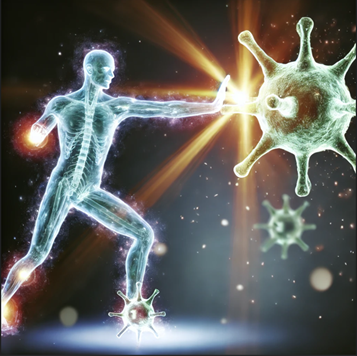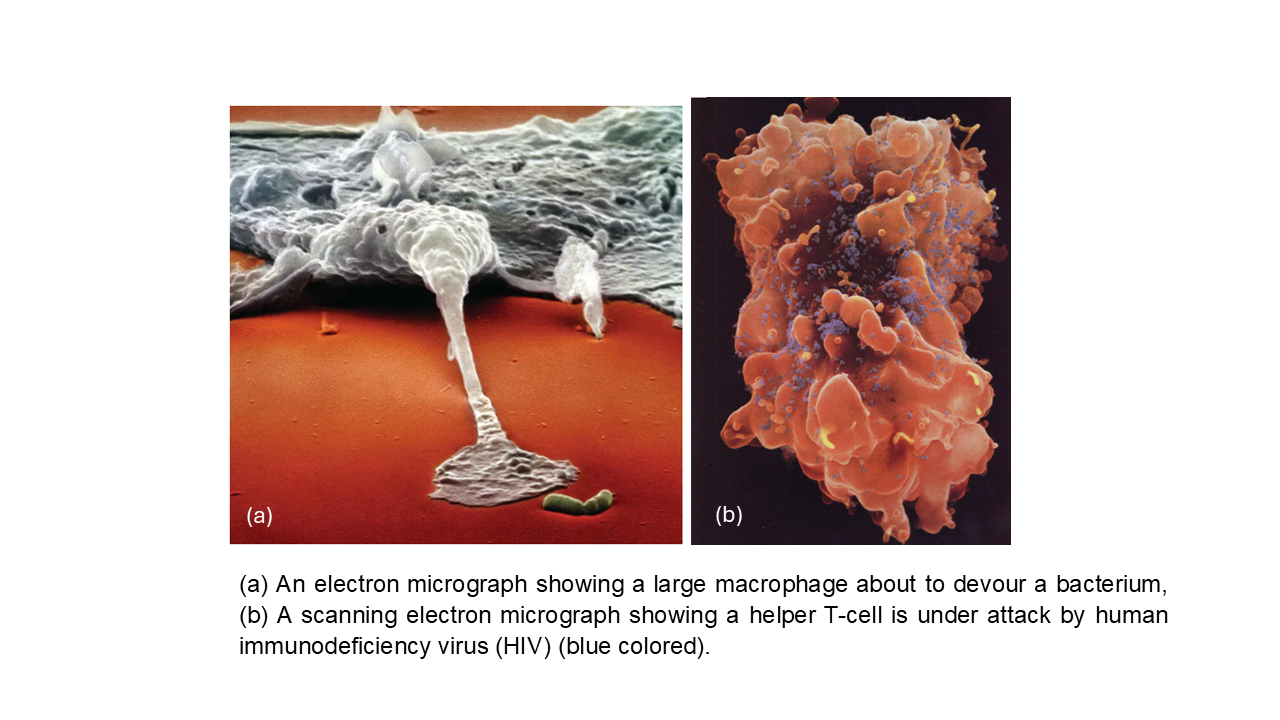The human immune system is nothing short of ordinary. It functions like an invisible shield, protecting us from countless germs, viruses, and even rogue cells that could turn into diseases such as cancer (Figure 1). This remarkable defense system has fascinated scientists for centuries. Early civilizations noticed that people who survived certain diseases rarely contracted them again. What makes the immune system truly remarkable isn’t just its complexity; it’s also its intelligence and adaptability.
Two Levels of Defense: A Dual-Wonder System
The immune system is a “team effort,” with two major groups working together to protect our bodies: innate immunity and adaptive immunity.
i. Innate Immunity: This is the body’s first line of defense, acting immediately after the physical barrier of skin or mucosa is breached. It includes immune cells like macrophages and dendritic cells (Figure 2a). The term "innate" reflects that this system is found in all animals. Some components of the innate immune system, such as macrophages, have existed for over 500 million years! In fact, the way macrophages ingest invaders is a refined version of the feeding process used by amoebas for about 2.5 billion years - showing that certain immune mechanisms have ancient roots.
ii. Adaptive Immunity: This system provides a more tailored defense. When a new germ enters the body, adaptive immunity takes longer to react, but it creates a highly targeted response. B cells and T cells are key players in this process, capable of adapting to nearly any invader (Figure 2b). While many animals rely on natural barriers and innate immunity alone, vertebrates like humans have this additional, specialized defense. The concept of adaptive immunity became clearer in the late 1700s, when Edward Jenner developed the first smallpox vaccine by exposing a young boy to cowpox, a virus related to smallpox. Jenner’s work showed that exposure to a mild pathogen could protect against a more deadly one, laying the foundation for modern vaccination. This legacy lives on in the word "vaccine," which comes from "vacca," the Latin word for cow.
Immune Memory: A Marvel of Learning and Remembering
One of the immune system’s most remarkable features is its ability to remember. After encountering a pathogen for the first time, the immune system "remembers" how to fight it, providing lasting immunity. This memory response, which is the basis of how vaccines work, was first demonstrated in the 1880s when Louis Pasteur created vaccines for rabies and anthrax, laying the groundwork for immune memory in medicine.
Both the innate and adaptive immune systems have their own forms of memory. The innate immune system’s memory is "hard-wired," relying on pattern recognition receptors that evolved over millions of years. In contrast, adaptive immunity creates a more personalized memory through B and T cells, which learn from each unique exposure during a person’s life. This makes adaptive immune memory highly specific and unique to everyone.
Imagine the immune system as a vast library, constantly updating its catalog of pathogens and storing detailed instructions on how to defeat each one. This "library" is always on standby, ready to defend the body whenever needed.
A Beautiful Distinction: Self vs. Not-Self
While the immune system's memory is awe-inspiring, its ability to distinguish "self" from "non-self" is just as crucial. Every cell in our body carries markers - like little ID cards - that signal it belongs to us. Any cell without these markers is flagged as a potential invader.
In the early 20th century, scientists like Paul Ehrlich helped shape the "self vs. non-self" principle, which remains a cornerstone of immunology. Though the immune system is usually precise in its recognition, mistakes can occur. When the immune system attacks its own cells, autoimmune diseases such as lupus or rheumatoid arthritis can develop. Our understanding of “self” recognition has also played a critical role in transplantation science, helping to develop strategies to prevent organ rejection.
Cancer Defense: The Immune System’s Secret Surveillance
A lesser-known but equally remarkable aspect of the immune system is its ability to prevent cancer through immune surveillance. Certain immune cells are constantly on the lookout for abnormal cells, identifying and destroying them before they can grow and spread. In the 1970s, scientists began investigating how immune cells recognize and eliminate cancer cells—a discovery that ultimately led to the development of immunotherapy treatments. These treatments boost the immune system's natural ability to target and fight cancer, offering new hope for diseases that have been difficult to treat.
This surveillance system that catches harmful cells before they can take hold is another testament to the immune system’s intelligence and adaptability.
The Future of Immunity: New Frontiers
Scientists continue to uncover new aspects of the immune system. Recently, researchers have been studying the gut microbiome—the trillions of bacteria in our digestive system—to understand how it influences immune function. In addition, groundbreaking treatments like gene editing and personalized immune therapies are on the horizon, potentially offering breakthroughs for chronic diseases and cancers.
Conclusion: A Constant Guardian
Our immune system is truly one of the body’s greatest wonders. Its ability to adapt, remember, protect, and even heal wounds makes it a vigilant guardian of our health. Despite occasional overreactions or mistakes, its resilience and intelligence are awe-inspiring.
From the early observations of healers to the discoveries of modern immunology, our understanding of this system has evolved, revealing layer upon layer of complexity. Supporting our immune system through healthy lifestyle choices and appreciating its remarkable functions can help us live longer, healthier lives. So, the next time you experience a sneeze or sniffle, remember that your immune system is hard at work, performing extraordinary feats every day to keep you safe.
References:
1.Sompayrac LM. How the immune system works. John Wiley & Sons; 2022.
2.Abbas AK, Lichtman AH, Pillai S. Basic immunology: functions and disorders of the immune system. Elsevier Health Sciences; 2015.
3.Hausmann E. The Song of the Cell. The Story of Life Siddhartha Mukherjee. 2024.
SDG 3 - Ensure healthy lives and promote well-being for all at all ages



